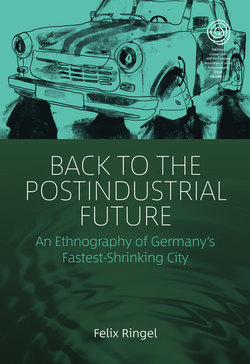Читать книгу Back to the Postindustrial Future - Felix Ringel - Страница 9
На сайте Литреса книга снята с продажи.
Acknowledgements
ОглавлениеI owe thanks to the citizens of Hoyerswerda, foremost for teaching me so much about life, but also for their hospitality, openness and kindness. When I arrived in Hoyerswerda in January 2008, it was the height of the international financial crisis. My informants could only shrug at this crisis. ‘A new crisis? We had a crisis for years already.’ With the same stubborn attitude, they first eyed a young anthropologist embarking on his first fieldwork. What then happened was as unexpected for them as it was for me. Cycling through the city, from an appointment in the New City to a meeting in the Old City and then back to a party in some abandoned apartment house at the outskirts, I met a lot of very different people. They always treated me kindly, answered my numerous questions, and guided me through the city and its surroundings. Young and old shared a lot of thought, wit, tea and cake with me. Many schools, clubs and other institutions opened their doors to me, and endured the odd onlooker into their professional and private lives. I think it is fair to say that we have mutually learned a lot from one another on a very transparent journey back to a city that kept on shrinking in the meantime.
Throughout my sixteen months of fieldwork, my host families and newly found friends were simply wonderful and sustained me in many ways. I want to express heartfelt gratitude to my overall seven host families for providing me with much-appreciated new homes during my fieldwork: Regina, Andreas and Franzi Schütze with Markus, Oma Helga as well as Jule and Axel Kiermeyer; Heike, Micha, Franzi and Basti Kalkbrenner; Kersten Flohe; Angela and Hajo Donath; Katrin, Rocco and Sebastian Schäfer as well as Oma Brigitte; Moni, Ralph and Genia Büchner; and Dorit, Carsten and Ria Baumeister with Dirk Lienig. Just a few of my friends include Benni, Willy, Ria, Ise, Rick, Proksch, Ollum, Fidschie, Hanni, Dennis, Alex, Florian, Uwe, Sabine, Röhli, Angela, Elke, Claudia, Marita, Jo, Ute, Gerhard (Schlegel and Walter), Waltraut, Helfried, Rosemarie, Renate and Peter. Special thanks go to Steffi Schneider for sharing the joys and burdens of the ‘AnthroCamp’ project, and to her, Mandy Decker and Inge Williams for making the ‘PaintBlock’ project happen. Mirko Kolodziej has been the best ‘office manager’ I could wish for when writing journalistically, and thinking generally, about Hoyerswerda.
I would also like to acknowledge the many members of the following social clubs and institutions, whose continuous patience and hospitality contributed enormously to my research: Seniorenakademie Hoyerswerda e.V., Kunstverein Hoyerswerda e.V., Kulturfabrik Hoyerswerda e.V., Spätlese Hoyerswerda e.V., Kulturbund Hoyerswerda e.V., Braugasse 1 e.V., AntifaAG Hoyerswerda, Initiative Zivilcourage Hoyerswerda, StadtZukunft e.V., the Hoyerswerdaer Tageblatt, the Stadt Hoyerswerda, particularly Lord Mayor Stefan Skora, and the Lessing-Gymnasium Hoyerswerda, especially the musical class and the theatre group of the year 2008/09.
I applaud the courage, enthusiasm and hard work of Hoyerswerda’s inhabitants. To paraphrase Leo Tolstoy, happy cities might as well be alike, and every unhappy city might be unhappy in its own way. However, cities are also unique with regard to the manner in which they reclaim their future (and) happiness, and respond to their problems. Hoyerswerda’s problems are similar to those in Flint, Michigan (United States), Yūbari (Japan), Nowa Huta (Poland) or, indeed, Durham (United Kingdom), where I am writing these lines. In particular smaller postindustrial cities have to find their very own way out of the structural crises that affect their existence. The people living in Hoyerswerda, I hope, have found their response and are – as some of my friends had it – ‘deeply relaxed’ (tiefenentspannt) about, and still ‘fervently’ (mit Inbrunst) working on, their prospects. I wish them and their city all the best for the future.
Many institutions have funded this project: the German Study Foundation, the University of Cambridge, Sidney Sussex College, Cambridge, and the Economic and Social Research Council of the UK (PTA-031-2006-00210). I thank them for making this work possible. Parts of Chapter 2 have been published in FOCAAL 66 (2013) and an earlier version of Chapter 5 has appeared in the Journal of the Royal Anthropological Institute 20(S1) (2014).
I have presented aspects of this work at several research seminars. I owe debts to colleagues at the Anthropology Departments at Brunel (United Kingdom), Cambridge (United Kingdom), Maynooth (Ireland), Copenhagen (Denmark) and Vienna (Austria). I also owe Laura Bear and the colleagues of her ‘Conflicts in Time’ research network for inspiring conversations, Maya Shapiro for co-organizing the 2013 AAA panel on Urban Affect, and Tatjana Thelen and the Postsocialism reading group in Vienna for continuing debates. Nina Gribat and Wolfgang Kil have been co-explorers of Hoyerswerda many a time, and I hope we can at some point put these conversations in writing. I am also grateful for the advice of three anonymous reviewers, the old and new series editors Eeva Berglund and Aleksander Bošković, and the rest of the team at Berghahn Books. Over the years, many scholars have influenced my thought and facilitated my intellectual wellbeing. Special thanks goes to Paul Rabinow, Alexei Yurchak, Marilyn Strathern, Susan Bayly, Chris Kaplonski, Stef Jansen and, most importantly, Nikolai Ssorin-Chaikov.
Finally, I am endlessly grateful to my family and friends from my original home, especially to my father Thomas, my sister Nadja with Norbert, Clara and Hannes, and my grandmother Ilse Purfürst. Alice von Bieberstein and Eirini Avramopoulou have shared the burden the whole way. Even more so has Emily Thomas, who continues to impress me with her own metaphysics everyday anew. She has endured much in relation to this book. To spend as many presents with her as I can is my best reward.
